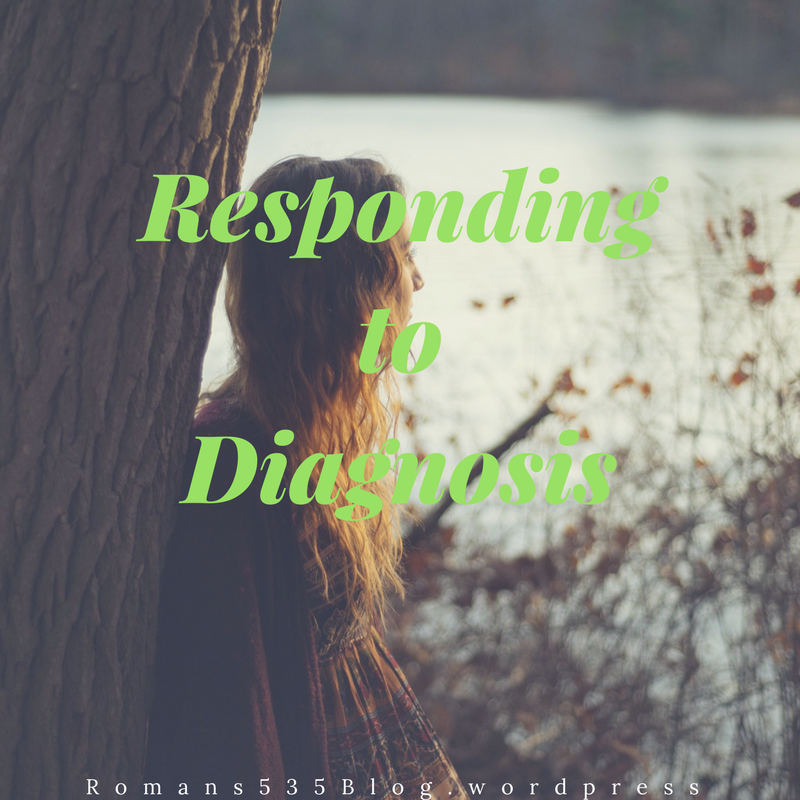Emily over at Called To Watch posted a great article about diagnosis and how to handle it when you aren’t the person who is sick- but a loved one or someone that you know is. It inspired me to share a little bit about my own diagnoses…
I generalize my various illnesses as Toxic Black Mold poisoning, Lyme disease, and Multiple Chemical Sensitivity. They each had their own version of diagnosis, and to be honest, some of them are difficult to really recognize a diagnosis date on.
When I first got sick, however, there was about nine months of unknown. Clearly something was wrong with me. We just had no idea what the cause was. The full story is shared here, but through clearly God-orchestrated events, we discovered the mold- in my body and in our house. We self-diagnosed it first, and I didn’t return to our house. By the time to official blood test results got back from the doctor, I was living at a friend’s house. My reaction to both the phone call I received from my mom and my dad showing up with a teddy bear was… a big smile. I beamed all night, and it was like some sort of party over at my friend’s house.
I know, I know, that sounds wrong. But think about it- it had been nine months of pain and confusion, with NO idea why. This was an answer! This was hope that we could start treating it correctly, and maybe I would get better soon!
My next diagnosis wasn’t so easy at that, but I didn’t mourn too much about it at the time either. It was the Multiple Chemical Sensitivity diagnosis. This one was more of a slow realization over time, and came in stages. Every few months we would slowly realize a greater severity of it than we had originally understood, and things would change again in our lives to make room for it. This resulted in several purges, but while it had (and continues to have) huge life-consequences, and I wasn’t exactly excited to find out about it, it wasn’t a huge scary thing (then).
Finally, Lyme. That one began with some suspicions as we learned that many mold and Lyme symptoms are so similar, but culminated very abruptly with the appearance of one symptom in particular. This time, diagnosis was a scary time. I didn’t know how to handle it, and I spent a few days (or months) outwardly quiet, but inwardly wrestling it out with God internally.

Each of my diagnoses were different, and I really think that the full weight of most of them didn’t crash on me in the moment. The first one was a celebration after all! I didn’t realize at that point all that my sicknesses would entail. I learned to grieve them later… as I was going through them, as I lay in pain or boredom, as I sobbed on the floor, as I fought illness-induced anxiety, and now, as I try to get better.
Maybe it’s the same for you, maybe it’s not. Maybe you had seen others go through it before and knew exactly all the awful things your sickness would encompass, or maybe you had no idea what you were getting into. Maybe you were indifferent. Maybe you celebrated. It’s different for each one of us, as each one of us are different and so are our situations.
That’s okay.
You’re allowed to grieve and you’re allowed to have no idea what you should feel. But after that, you are faced with a choice. How will you respond? How will you fight? How will you learn to hope? It starts now, and we can’t avoid it- in the coming days it will get harder.
As C.S. Lewis says in his book The Silver Chair:
“Crying is all right in its way while it lasts. But you have to stop sooner or later, and then you still have to decide what to do.”
Maybe you’re afraid of the days to come, or you are mourning the youth that this diagnosis is stealing from you, or maybe something else entirely. Again, that’s okay. Simply run to Jesus’ arms and allow Him to scoop you up and hold you. Trust Him, and choose to hold on to hope.
Know, also, that eventually the shock is going to have to be overcome. The tears will have to stop sooner or later, and then you will have to decide what to do.
One final thing to keep in mind during the time of diagnosis is the other people around you. Emily’s post opened my eyes to see more clearly what they might be going through. They may be shocked, afraid, or mourning as well. They may be trying to process how your diagnosis is going to affect their lives or your relationship. You may not be strong enough to be their comfort right now… you may need them, instead, but be aware that things aren’t easy for them either. Allow them mercy and time to process things in their own way as well. Try your best to make things easy on them.
No, don’t hide your emotions from them. Allow them to be there for you during this time and hear your thoughts. But also try to smile- for them. Try to lift yourself up out of whatever you are feeling once the tears come to an end (sooner or later) for them. Keep fighting, and pay attention to how they are feeling as well.

Naw… our two posts make a nice pair 🙂 Thanks for the shout out – and for your thoughtful, realistic but encouraging post. I love that even though our view points may be opposites, our posts are actually quite similar. On a side note, I love C. S. Lewis. Have you read much of his non-fiction works?
I’m glad you liked it! Yes, it’s funny, I was just telling my mom the other day “so, I found this blog that’s like the counterpart to mine…”. 🙂 I really appreciate your point of view on such similar topics. Yes, C.S. Lewis is great! I’ve read quite a few of his fiction books, but so far I’ve only read the Screwtape Letters when it comes to his non-fiction books (if that one’s nonfiction?). What about you? Do you have any favorites?
Yay, we should stay in contact 🙂 Hmm… I think it’s fiction haha 🙂 But sorta borderline 😉 Argh I love so much of his stuff, but it depends what you’re into – because He was an English professor some of it is quite English-y. He wrote: The Problem of Pain, The Four Loves, An Experiment in Criticism, a book on the Psalms, Letters to Malcolm, several collections of essays, including “The Elephant and the ferntree” and “The Weight of glory” (you can get this latter one as a stand-alone pdf online. It’s worth it), Mere Christianity, The Discarded Image (loved this, but it’s sort of medieval cultural criticism, so not everyone enjoys it) … I could go on and on! Which fiction of his have you read? Have you read his Sci-fi trilogy: That Hideous Strength? Super good!
Yes, now that I think about it again, I definitely think that it’s fiction… #brainfog 😉 Yes, most of those have been on my list for a long time now, I just haven’t gotten to them yet. 🙂 Yes, I’ve read two and a half of the books in his Space Trilogy, and also Till We Have Faces, and the Chronicles of Narnia (more time than I can count). Plus the Screwtape Letters. 🙂 He’s a very talented writer!
Wonderful post, Sara!! 🙂 I can relate to the grief in the aftermath of a hard diagonosis, and mine basically sent me reeling with shock. It took a while to process. But God is there in those painful and fearful moments and all that follows!
Thank you, Mary! Yes, so true. He never leaves us. 🙂 (Also- I’m so so sorry about my long overdo email. I’ll try to reply soon!)
Sara, God is using you to bless me in deep ways. Thank you.
It encourages me so much to hear that! I’m so glad that God is using my story to bless you.
Thank you for this post, Sara! It IS okay to not know how to feel, just like you said. 🙂